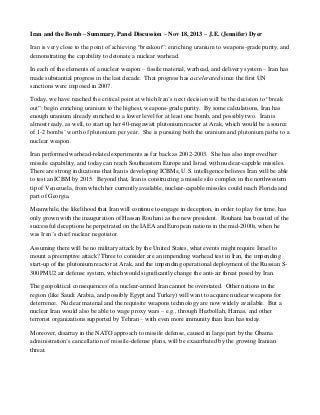
Iran and the Bomb – Summary, Panel Discussion – Nov 18, 2013 – J.E. (Jennifer) Dyer
- 1. Iran and the Bomb – Summary, Panel Discussion – Nov 18, 2013 – J.E. (Jennifer) Dyer Iran is very close to the point of achieving “breakout”: enriching uranium to weapons-grade purity, and demonstrating the capability to detonate a nuclear warhead. In each of the elements of a nuclear weapon – fissile material, warhead, and delivery system – Iran has made substantial progress in the last decade. That progress has accelerated since the first UN sanctions were imposed in 2007. Today, we have reached the critical point at which Iran’s next decision will be the decision to “break out”: begin enriching uranium to the highest, weapons-grade purity. By some calculations, Iran has enough uranium already enriched to a lower level for at least one bomb, and possibly two. Iran is almost ready, as well, to start up her 40-megawatt plutonium reactor at Arak, which would be a source of 1-2 bombs’ worth of plutonium per year. She is pursuing both the uranium and plutonium paths to a nuclear weapon. Iran performed warhead-related experiments as far back as 2002-2003. She has also improved her missile capability, and today can reach Southeastern Europe and Israel with nuclear-capable missiles. There are strong indications that Iran is developing ICBMs; U.S. intelligence believes Iran will be able to test an ICBM by 2015. Beyond that, Iran is constructing a missile silo complex in the northwestern tip of Venezuela, from which her currently available, nuclear-capable missiles could reach Florida and part of Georgia. Meanwhile, the likelihood that Iran will continue to engage in deception, in order to play for time, has only grown with the inauguration of Hassan Rouhani as the new president. Rouhani has boasted of the successful deceptions he perpetrated on the IAEA and European nations in the mid-2000s, when he was Iran’s chief nuclear negotiator. Assuming there will be no military attack by the United States, what events might require Israel to mount a preemptive attack? Three to consider are an impending warhead test in Iran, the impending start-up of the plutonium reactor at Arak, and the impending operational deployment of the Russian S300PMU2 air defense system, which would significantly change the anti-air threat posed by Iran. The geopolitical consequences of a nuclear-armed Iran cannot be overstated. Other nations in the region (like Saudi Arabia, and possibly Egypt and Turkey) will want to acquire nuclear weapons for deterrence. Nuclear material and the requisite weapons technology are now widely available. But a nuclear Iran would also be able to wage proxy wars – e.g., through Hezbollah, Hamas, and other terrorist organizations supported by Tehran – with even more immunity than Iran has today. Moreover, disarray in the NATO approach to missile defense, caused in large part by the Obama administration’s cancellation of missile-defense plans, will be exacerbated by the growing Iranian threat.
